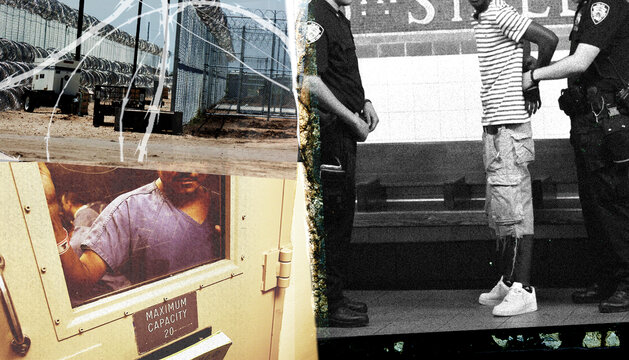
Countering Excessive Punishment with Chances for Redemption
A personal story shows the full costs of an unfair system and demonstrates how it can be improved.

Part of
This essay is part of the Brennan Center’s series examining the punitive excess that has come to define America’s criminal legal system.
“Carlton, I need to tell you something.” No eight-year-old son wants to hear these words from his mother, her face marred with distress, her voice trembling. Sitting on the side of her bed anticipating what she was soon to disclose, I looked in her eyes and held my breath.
She said, “Kendrick is not coming home for a while.” In disbelief and bewilderment, I replied, “What do you mean? What happened? How long is ‘a while’?” The tears she attempted to hold back burst into a river of emotions.
Later that evening, I saw my eldest brother’s face plastered across the local evening news. I do not remember the news anchor’s words, but I will never forget seeing Kendrick handcuffed and escorted from a building into the back of a police car. I felt like the floor beneath me had opened and swallowed me, sinking me deeper into a pit of shame, helplessness, and frustration. What lay ahead was unfathomable.
My brother’s absence would have devastating emotional, financial, and health impacts on my family. It was this pain that led me to encounter America’s peculiar taste for punishment, which plagues 113 million adults who have or have had a loved one in jail or prison. In this pain, I found my purpose and dedicated my life to becoming an attorney and champion for criminal justice reforms not only in my home state of Louisiana, but across the country.
Considering the quantifiable and qualitative generational impact of excessive punishment on families and communities around the country, this issue is more than a criminal justice issue: it is a human rights issue. We are in a crisis — a crisis that has defined the trajectory of my life.
• • •
Kendrick’s excessive sentence was a direct result of an unspeakable policy enacted in the intense wave of racism that engulfed the southern states in the wake of Reconstruction. He was effectively consigned to life in prison even though the jury in his trial did not come to a unanimous verdict. Among the “Black codes” and convict-leasing laws of the Jim Crow era that enabled a white society to imprison Black people virtually by whim — for offenses such as loitering, breaking curfew, and failing to carry proof of employment — Louisiana waived the requirement for a unanimous jury in all but capital cases. It was an especially effective way for Black people to be convicted and consigned to an equivalent of slavery, with the state leasing them to plantations, coal mines, and railroad companies.
This scheme was embedded in the law not merely by legislative act, but by its insertion into the state constitution itself. The right to a jury trial may be a fundamental guarantee of the Sixth Amendment of the U.S. Constitution, but Louisiana’s constitutional convention of 1898 came up with its own view of how a jury might operate. Article 116 had a clear origin: according to one committee chairman, the 1898 constitution was specifically designed “to establish the supremacy of the white race.” Nonunanimous jury verdicts, which allowed punishment based on a 10 to 2 jury vote, would deny thousands of Black Louisianans their right to a unanimous jury, increase Louisiana’s convict leasing labor force, and intensify the disenfranchisement of Black citizens.
In the Spring of 1999, just over 100 years after Article 116 was adopted, a nonunanimous jury convicted my brother of armed robbery and two counts of attempted murder. Two jurors voted to acquit because they had reasonable doubts about my brother’s culpability due to inconsistent statements by the survivors and testimony about the accused’s identity. This was during the heart of the “tough on crime” era, when federal and state policymakers engaged in an unprecedented expansion of prisons and prison populations. Mandatory minimums, sentencing enhancements, restrictive parole release policies were the order of the day.
Consequently, due to prior convictions, Kendrick’s sentence was enhanced to 64 years and 11 months, and an administrative determination made him ineligible for parole. My brother wrestled with untreated addictions and repeated interactions with the justice system as a young man, but he was still a young man, just 28 years old. No one had been killed in the crime for which he was sentenced. No unanimous jury had ever determined that he was in fact guilty. Yet he was given a de facto life sentence with no hope of ever coming home. In short, he was convicted and sentenced to die in prison — and my family had to serve this time with him.
Kendrick was consigned to a prison system that is notoriously violent, lacks independent oversight, and undermines the health and wellbeing of those housed and staffed in them. Much of my brother’s incarceration was spent at Louisiana State Penitentiary, a former slave plantation better known as Angola, the largest maximum-security prison in the nation. It is considered one of America’s most violent and abusive prisons. Kendrick was subjected to working in its fields, supervised by shotgun-toting correctional officers riding on horseback. He was one of many who would rather risk solitary confinement than work in these torturous fields.
Finally, after serving nearly 24 years, in 2021, life came full circle for Kendrick and for our family. Building on the historic Louisiana justice reforms of 2017 that I was fortunate to play a role in shaping, justice advocates secured the enactment of a landmark elder parole law that could be retroactively applied to my brother. On December 14, 2021, thanks to the efforts of organizations like the Louisiana Parole Project, Voices of the Experience, and First72+, I had the pleasure of supporting my brother at his parole hearing. A unanimous decision granted him his release. Two days later, Kendrick walked out of the prison walls and whispered words that shook my core: “Thanks for not forgetting me, little brother!”
In 2018, Louisiana voters overwhelmingly chose to eliminate Article 116 from the state constitution. The following year, the U.S. Supreme Court declared such convictions unconstitutional. Yet today, the Promise of Justice Initiative, a New Orleans-based legal services and advocacy nonprofit, must continue to advocate for the approximately 1,500 people who are still in Louisiana’s prisons because of nonunanimous jury convictions.
• • •
Previous essays in this series have highlighted the many ways America’s excessive reliance on punishment has harmed families and communities and weakened our democracy. In my case, over the past two decades, my brother’s incarceration has taught me some essential lessons.
Chief among them: if we are going to end the incarceration crisis, we need to see that people are redeemable and can be restored because, as Bryan Stevenson says, “each of us is more than the worst mistake we have made.” It begins with interrogating and abandoning labels such as “felon,” “criminal,” “inmate,” or “offender,” because they work on a broad misconception that those incarcerated for violence are dangerous and irredeemable and fail to account for the fact that so many of the incarcerated have been victims or witnesses of repeated violence in their own communities and suffer from untreated trauma.
I witnessed my brother traverse this valley of despair with a resolute hope despite the fact he was not eligible for early release, even though in his years in prison he worked earnestly, attained occupational licenses, and mentored other incarcerated people. His character gained him the respect of the wardens, staff, and others housed in prison. Yet his past excluded him from earning good time credits that could reduce his sentence. But he never gave up hope, and redemption finally arrived.
By centering on redemption and restoration, we can counter excessive punishment through policies that promote racial justice and creating release opportunities for those serving long prison sentences for violent offenses. Research by the Urban Institute recently found that one in five people in prison for at least 10 years is a Black man incarcerated before age 25. In addition to highlighting the racial disparities in extreme sentencing, this finding also reinforces the harm that is caused when we “lock people up and throw away the key.”
Correctional leaders and parole authorities play an important, often opaque role in American prison policy and have an immense degree of discretion over prison releases. In 34 states, these policymakers have legal authority over the ultimate duration of most prison sentences. Any prison reform efforts to reduce the prison population must focus a significant degree on prison-release discretion through retroactive and prospective policies that remove parole eligibility exceptions, expand elder parole and compassionate release, allow for “second look” resentencing, and increase earned and good time credits.
These “levers of change” will reduce the amount of time people spend in prison. In recent years, we have seen legislators in 25 states introduce bills that allow incarcerated people an opportunity to have their sentences reduced or to be considered for early release. In my brother’s case, such a law brought Kendrick an immediate pathway home.
At the heart of our collective effort to change America’s reliance on punitive excess is the acknowledgement of people’s humanity, the belief that people can be redeemed and restored. This acknowledgement underpins our shared movement to reimagine what investments in people, not punishment, can do. These bedrock values are the foundation of the constitutional guarantees of equal protection, liberty, and due process. They can serve as a lighthouse beam cutting through the blinding fog of excessive punishment and calm the troubling waters of a fear that seek to divide us. If we can keep our eyes on this light, it can guide us to the shores of a stronger democracy that is inclusive, equitable, and promotes healthy families and communities.
Carlton Miller is a director of Criminal Justice at Arnold Ventures and former policy adviser for Louisiana Gov. John Bel Edwards.
More from the Punitive Excess series
-
Beyond the Era of Punitive Excess
Reckoning with our overreliance on excessive punishment requires a commitment to truth-telling. -
The Era of Punitive Excess
The criminal justice system is marred by an overreliance on excessive punishment. -
How Punitive Excess Is a Manifestation of Racism in America
The criminal justice system’s past and present is intertwined with its use as a tool against people of color.



